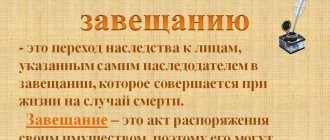Home » Inheritance » Inheritance by law: order of inheritance (scheme)
72
If during his lifetime the testator did not have time to draw up a will or it does not cover all the property of the deceased, then the transfer of property rights to the successors occurs depending on the degree of their relationship. This procedure is called inheritance by law and is regulated by Chapter 63 of Federal Law No. 146 “Civil Code of the Russian Federation” dated November 26, 2001. (hereinafter referred to as the Civil Code of the Russian Federation).
Order of succession by law (scheme)
The Civil Code of the Russian Federation defines the following number: 7 degrees of kinship or 7 lines of inheritance. The property is divided into shares in proportion to the number of heirs in one line and transferred on a descending basis, i.e. from closest relatives to distant ones. If there are no heirs of previous lines, the right to receive a share passes to the successors of the next line.
According to Art. Art. 1142-1145 successors are:
- First priority : children, surviving spouse and parents;
- The second line is brothers and sisters (full and half-blood), paternal and maternal grandparents;
- Third line - uncles and aunts (full and half-blooded);
- The fourth stage - consists of great-grandparents;
- The fifth stage includes cousins/granddaughters (i.e. children of the testator’s own nephews and nieces), as well as great-uncles/grandmothers;
- The sixth line is cousins, great-grandchildren, nephews, nieces, uncles and aunts.
- The seventh line is stepsons, stepdaughters, stepfather and stepmother.
If the stepson and stepdaughter were officially adopted, they are equal to natural children and have the right to allocate a share as 1st line heirs.
If there are no successors in line, then the property will pass to the disabled dependents who were supported by the testator.
Schematically, the order of inheritance according to the law looks like this:
If there are no successors from the first to the seventh order or refuse the property, then it is recognized as escheat and becomes the property of the state.
In addition to the absence of a will, the Civil Code of the Russian Federation identifies the following situations of accepting an inheritance by law:
- Challenging a will in court and declaring it invalid.
- Refusal of relatives to inherit.
- Lack of successors entitled to the property of the deceased.
- The will specifies only the circle of persons whom the testator is depriving of inheritance.
Migrating to Postgres Inheritance
Table inheritance appeared in Postgres quite a long time ago (most likely there will be no need to update the version) and is close to the concept of class inheritance. Just not classes, but tables, and not in Ruby, but in Postgres.
You still have the topics table, but you expand it not through a set of additional fields in this table itself, but through additional tables containing only fields unique to each class.
The easiest way to show it is with an example:
CREATE TABLE topics ( headline text, author_id int ); CREATE TABLE topics_onlines ( status char(2) ) INHERITS (topics);
Having created topics_onlines, we can work with it as with a regular table, which will have all three fields:
class Topics::Online < Topic # headline, author_id, status end
It's simple, beautiful, and doesn't require massive code rewriting.
Postgres Inheritance + Rails
SELECT c.tableoid, c.headline, c.author_id FROM topics c tableoid |
headline | author_id ———-+————+———- 139793 | Las Vegas | 2174 139793 | Mariposa | 1953 139798 | Madison | 845 Parent and child tables are linked within Postgres via tableoid. We will not see any tableoid joins in explain, all this works inside Postgres.
From the application, topics_onlines will look like a regular table without inheritance, containing all the fields from topics and online-specific fields from topics_onlines.
This means that on the Rails side you only need to write a migration that creates tables. And that table inheritance can be used with any framework.
Who inherits first?
According to Art. 1142 of the Civil Code of the Russian Federation, the main contenders for the inheritance mass are considered to be first-degree relatives: children, spouse, parents. However, there are some nuances here. Previously, we looked at examples of priority inheritance after death.
Children
All children of the testator have the right to allocate a share in the inheritance:
- biological (blood);
- by law - officially adopted stepsons and stepdaughters;
- extramarital - subject to documentary confirmation of the fact of relationship.
If there is an unborn heir, then the property cannot be divided until the moment of his birth (Article 1166 of the Civil Code of the Russian Federation).
Children have a priority right to inheritance even if one of the parents was deprived of parental rights through the court during their lifetime.
Surviving spouse
A spouse is considered the main beneficiary only if the relationship is officially registered in the registry office. In the absence of a will, a church marriage (wedding) or civil marriage (cohabitation) does not give the right to allocate a share in the inheritance. After divorce, spouses cannot inherit from each other.
According to Art. 256 of the Civil Code of the Russian Federation, the allocation of marital parts and the procedure for their division are regulated by the Family Code of the Russian Federation, according to which two parts are distinguished in the inheritance mass (AM): acquired before and during marriage. Marital share i.e. what was purchased during marriage usually amounts to ½ NM and belongs to the surviving spouse, and what was acquired before marriage is divided proportionally between the direct heirs, including the husband or wife.
For example: after the death of her husband, a widow and her daughter turn to a notary to open inheritance proceedings. The joint property includes an apartment that the husband inherited from his parents and funds on deposit accumulated by the spouses during their family life. In this case, the shares will be divided as follows: wife – ¾ of the deposit amount, daughter – ¼. The apartment will be divided equally.
An exception to the rule may be a situation where the surviving spouse can document the fact of investing money in property purchased before the wedding.
For example, after the death of a spouse, a car purchased before marriage becomes the inheritance item. However, during the marriage, the spouse invested money in the overhaul of the vehicle after an accident (straightening and painting of the body, engine overhaul, replacement of the windshield), for which there are supporting documents: a certificate of completion of work from the service station and a payment receipt certified by the bank, which shows that the payer was the widow. In this case, the wife can apply for the allocation of a part.
If during their lifetime a husband and wife entered into a marriage agreement (contract), then the allocation of the surviving spouse’s share will occur in accordance with the conditions specified in it.
Testator's father and mother
The main successors are:
- blood parents;
- official adoptive parents.
If the father or mother was deprived of parental rights in court, they cannot claim part of the inheritance.
If there is at least one relative from this list alive, then the entire inheritance goes to him, without involving 2nd line relatives.
For example, after the death of citizen P., his property is claimed by his daughter, son and sister. In this case, the shares will be distributed among the children. The sister is not a legal successor.
Preparing jsonb correctly
For the task of fully extending models, jsonb can be extremely toxic. Of course, PGI also has its limitations, but for our purposes they were overcome in one go, during migration.
Still, jsonb can be useful for loosely structured data from an external source. These fields don’t even need to be defined via store_accessor, you can simply save them as is, and then a separate Builder class will assemble something useful from them.
For us, such data was sports broadcasts taken from an external API.
Special categories of heirs by law
The so-called “special” categories of heirs entitled to receive an obligatory part of the inheritance mass include:
- Dependents who were supported by a deceased relative for at least a year. These could be people of retirement age, disabled people of groups 1, 2, 3, or disabled since childhood.
- Minor children of the deceased.
- Disabled children, spouse or parents.
According to Art. 1149 persons specified in clauses 1-3 can claim a share, regardless of the presence or absence of a will, or its composition. Moreover, the right to an obligatory share in the property must be satisfied even by reducing the shares of other heirs.
For example, during his lifetime, a man made a will in which he “signed off” all his property to his common-law wife. However, he has a living disabled father who is unable to work. In this case, the common-law wife will receive only ½. The other half will go to the father.
According to Art. 1169 of the Civil Code of the Russian Federation, a relative living in the same living space with the testator has a preferential right to furniture, household appliances and other household items.
STI+Jsonb
Jsonb
In Postgresql 9.4 it is possible to create jsonb type fields. How can this help us? By adding a data field of this type to topics, we can store all our additional fields in json keys.
You can connect it in Rails like this:
class Topics::Online < Topic store_accessor :data, :start_at, :live end
Now you can do this:
online = Topics::Online.new(live: true) online.live # => true
Or directly access json:
online['data']['live'] # => true
Transfer of inheritance rights
Heirs enter into inheritance rights in order of priority. Between relatives who are representatives of the same line, property is divided equally.
It is possible to transfer the right of inheritance from representatives of one line to another in the following cases:
- If there are no heirs in the highest priority.
- If the higher-ranking applicants did not claim the right of inheritance.
- In case of recognition of the heirs of a higher order as unworthy. Recognition occurs in court and concerns people who have committed illegal actions against the testator for the purpose of enrichment, evading payment of alimony or deprived of parental rights (Article 1117 of the Civil Code of the Russian Federation).
- In case of refusal of inheritance by representatives of one line.
To enter into inheritance rights, you must visit a notary and provide a number of documents confirming your relationship with the deceased; own identification documents, change of surname; confirmation of the deceased’s rights to property; application and other documents, the list of which will be provided by the notary.
Request by boolean field with limit
At least it already intersects with the real world.
PGI:
Gazeta::Topics::Sport::Online.megauho.limit(1000).explain * Gazeta::Topics::Sport::Online Load (9.1ms) SELECT "topics_sport_onlines".* FROM "topics_sport_onlines" WHERE "topics_sport_onlines". "type" IN ('Gazeta::Topics::Sport::Online') AND "topics_sport_onlines."."megauho" = $1 LIMIT 1000 [["megauho", "t"]]
Jsonb:
Gazeta::Topics::Sport::Online.megauho.limit(1000).explain * Gazeta::Topics::Sport::Online Load (23.7ms) SELECT "topics".* FROM "topics" WHERE "topics". "type" IN ('Gazeta::Topics::Sport::Online') AND ((topics.params->>'megauho')::bool = 't') LIMIT 1000
There is a difference.
Is inheritance possible by law in the presence of a will?
A will is not always the ultimate truth. There are cases of redistribution of property between heirs. The procedure is carried out in court. The basis for changing the will of the deceased is:
- Invalidation of the will.
- Missing the established 6-month deadline for submitting documents for inheritance.
- Recognition of heirs as unworthy.
- The absence in the testamentary document of persons who, regardless of the wishes of the deceased, should own a share of the inheritance.
In order to receive a part of the inheritance for a person not included in the will, it is necessary to challenge it. A document is declared invalid if the following facts occur:
- The testator was in a state of mental disorder and did not realize what he was doing.
- The deceased suffered from dementia or disorders of consciousness associated with extreme old age.
- The will was drawn up while the testator was under the influence of drugs or alcohol.
- The drafting of the will took place under pressure. This could include threats of physical harm, misrepresentation, or deception.
Verbal indication of the above facts is not enough. It is necessary to provide the court with medical certificates, extracts from the card, and sometimes the results of a post-mortem forensic psychiatric examination.
Also, a will can be challenged if it contains gross violations:
- information about the date and place of compilation is not indicated;
- the document reflects the will of a group of people, not just one person;
- the content of the document is contrary to the law;
- the document was drawn up by a person who does not have the authority to do so;
- signatures on the document are forged;
- the will does not indicate persons belonging to the group of compulsory heirs.
To challenge a will, a statement of claim is filed in court, indicating information about the plaintiff, defendant, testator, and describing the situation that caused the dispute. The application, which must be signed and the date of submission, is accompanied by documents confirming the violations. A receipt for payment of the state duty (300 rubles) is also attached.
The case is heard in the district or city court.
The period for challenging a will drawn up under pressure is up to 1 year, in other cases - up to 3 years.
PGI for low selectivity query
Index search will return 123 records out of a million, Index Scan.
PGI:
Gazeta::Topics::Sport::Online.megauho.megauho_by_date('2015-12-26').explain * Gazeta::Topics::Sport::Online Load (6.0ms) SELECT "topics_sport_onlines".* FROM "topics_sport_onlines " WHERE "topics_sport_onlines."."type" IN ('Gazeta::Topics::Sport::Online') AND "topics_sport_onlines."."megauho" = $1 AND (topics_sport_onlines.date = '2015-12-26') [[ "megauho", "t"]] QUERY PLAN ———- * Index Scan using index_type_megauho_date on topics_sport_onlines (cost=0.42..42.12 rows=20 width=682) Index Cond: (((type)::text = 'Gazeta ::Topics::Sport::Online'::text) AND (megauho = true) AND ((date)::text = '2015-12-26'::text)) Filter: megauho (3 rows)
Jsonb:
Gazeta::Topics::Sport::Online.megauho.megauho_by_date('2015-12-26').explain * Gazeta::Topics::Sport::Online Load (7.7ms) SELECT "topics".* FROM "topics" » WHERE "topics."type" IN ('Gazeta::Topics::Sport::Online') AND ((topics.params->>'megauho')::bool = 't') AND (topics.params ->>'date' = '2015-12-26') QUERY PLAN ———- * Index Scan using index_type_megauho_date on topics (cost=0.56..217.61 rows=27 width=948) Index Cond: (((type) ::text = 'Gazeta::Topics::Sport::Online'::text) AND ((params ->> 'date'::text) = '2015-12-26'::text)) Filter: ( (params ->> 'megauho'::text))::boolean (3 rows)
- PGI is faster.
- The larger the sample, the faster.
- For queries using indexes, PGI is still faster, but the difference is less noticeable.
Right of representation
Inheritance by right of representation arises if the heir dies before the death of the testator or together with him (Article 1146 of the Civil Code of the Russian Federation). In this case, inheritance takes place by law - the property is divided between the descendants of the heir.
Example. As a result of the plane crash, the grandfather (testator) and his son die. The son was to inherit a house and a dacha. Since the testator had no other heirs besides his son, the grandfather’s property passed to his two granddaughters - the son’s daughters. Each received 50% of the inheritance left by their grandfather.
Exceptions:
- The heir, by the will of the testator, was deprived of the right of succession.
- The law does not give the heir the right to allocate a part in the NM.
Inheritance of the property of a deceased heir who did not have time to enter into inheritance rights by law or will after the death of the testator is called hereditary transmission.
If after the death of the heir the period for registration of inheritance rights is less than 3 months, then according to Art. 1156 of the Civil Code of the Russian Federation, it is extended for another 3 months.
Single Table Inheritance
The first thing that comes to mind is the classic Single Table Inheritance. In Rails, it is automatically enabled if you inherit one model from another.
By creating one common table Topics and adding a service field type to it, you can store all classes inside one table.
class Topic < ActiveRecord::Base end class Topics::Article < Topic end class Topics::NewsItem < Topic end …
General logic (for example, publishing material) goes to Topic. Specific to inherited classes.
This simple and proven scheme has problems with scaling. What to do if there are already more than fifteen topic types and each has from two to ten unique fields?
At this point, database purists wince as if from a severe toothache - imagining a table whose rows are always filled no more than 15-20%.
Legal advice
Inheritance under the law is a complex and controversial topic. At the stage of division, disputes often arise regarding the allocation of marital parts, contradictions between natural and adopted children, and other irreconcilable differences. It is very difficult to defend your rights alone. In order not to lose to more “prepared” relatives and to achieve justice during division, contact the lawyers of the portal https://ros-nasledstvo.ru/ for a free consultation
FREE CONSULTATIONS are available for you! If you want to solve exactly your problem, then
:
- describe your situation to a lawyer in an online chat;
- write a question in the form below;
- call Moscow and Moscow region
- call St. Petersburg and region
Save or share the link on social networks
- FREE for a lawyer!
Write your question, our lawyer will prepare an answer for FREE and call you back in 5 minutes.
By submitting data you agree to the Consent to PD processing, PD Processing Policy and User Agreement
Useful information on the topic
123
State duty upon entering into inheritance in 2021
According to the legislation of the Russian Federation on taxes and fees upon entry into...
4
How to restore the missed deadline for accepting an inheritance
The law limits the period allotted for accepting an inheritance to 6 months from...
99
How to enter into an inheritance after death without a will according to law
A will is an act of unilateral expression of the will of the testator, allowing one to determine the future fate...
9
How to enter into an inheritance after the death of a husband
The rules and procedure for entering into inheritance are regulated by the third part of the Civil...
30
What documents are needed to bequeath an apartment in 2021
The reason for drawing up a will is the desire of the testator to clearly identify the future owners...
21
Inheritance of a privatized apartment after the death of the owner by law and will
After privatization, the apartment used on the basis of a social tenancy agreement passes...
Speed - PGI vs jsonb
The final step would be to evaluate performance. Since all this was started for the sake of ease of development, not much time was devoted to testing the speed of PGI, but some conclusions can be drawn.
After the migration, two versions of the application were raised, PGI and the old one with jsonb. More than 5_000_000 topics in each database.
Number of all topics
The most synthetic example:
PGI:
Topics::Topic.count (8591.6ms) SELECT COUNT(*) FROM “topics” => 5316226
Jsonb:
Topics::Topic.count (8580.1ms) SELECT COUNT(*) FROM “topics” => 5316226
Don’t be surprised by the strange number; topics were created until the space on the ssd ran out.
Number of topics of one type
PGI:
Gazeta::Topics::Sport::Online.count * (219.5ms) SELECT COUNT(*) FROM "topics_sport_onlines" WHERE "topics_sport_onlines.""type" IN ('Gazeta::Topics::Sport::Online') = > 1000000
Jsonb:
Gazeta::Topics::Sport::Online.count * (419.0ms) SELECT COUNT(*) FROM “topics” WHERE “topics.”type” IN ('Gazeta::Topics::Sport::Online') = > 1000000
How to prove your belonging?
In order to prove that you belong to any line of inheritance, you must present the following documents to the notary for inheritance matters (if available):
- birth (or adoption) certificate;
- Marriage certificate;
- extracts from the registry office books, metric books;
- documents from government agencies and institutions from the place of registration (for example, an extract from the house register);
- necessary documentation from the employer (for example, a photocopy of a personal personnel record sheet);
- entries in separate sheets of the personal passport (filled-in columns indicating the presence of 1 or several children, registered marriage);
- an agreement on the payment of alimony or a court decision on the collection of alimony, certifying the fact of being dependent on the deceased;
- pension certificate, certificate of disability group, certificates from the university about full-time study, etc., officially confirming the presence of disability.
If it is impossible to confirm your rights of inheritance (neither documented nor in court), the notary enters the heir into the certificate of inheritance with the official consent of other heirs. This consent is formalized by a separate written statement from each of the testators and certified by a notary.






